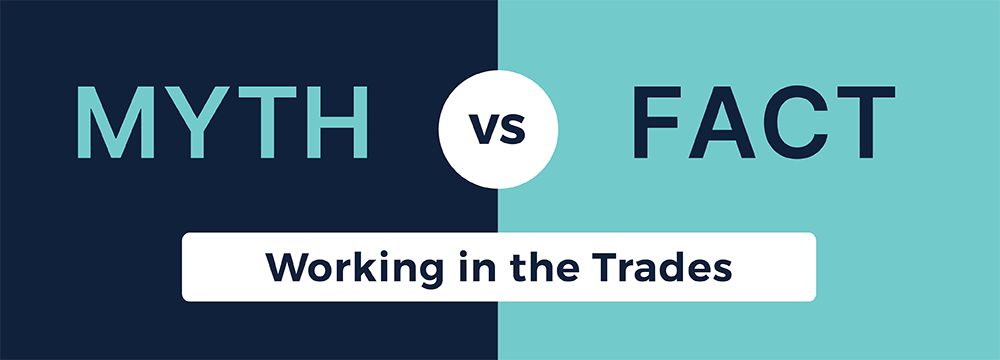
Debunking the Biggest Myths Surrounding the Skilled Trades
If you close your eyes and think about the skilled trades, what comes to mind? Is it that:
- It’s hard to find a job in skilled trades?
- The trades are only for men?
- There are no opportunities to advance?
- Tradespeople don’t make enough money?
If one of those thoughts popped in your head, you’re not alone. Those are some of the most common myths and misconceptions of the industry — and we’re here to help you debunk them.
Myth 1: It’s hard to find a job in skilled trades.
FACT: Skilled trades jobs are in high demand.
There continues to be a significant shortage of skilled trades workers across the U.S. According to the Associated Builders and Contractors (ABC), the construction industry needs to attract more than 439,000 additional workers to meet labor demands.
Analysts at McKinsey & Company note that the demand for carpenters, electricians, welders, and plumbers will continue to outpace supply for years to come. Meanwhile, The Conference Board projects persistent shortages in construction, manufacturing, and utilities throughout the decade.
So if you’re thinking of entering a trade, the timing couldn’t be better — there’s strong demand and plenty of opportunity.
Some of today’s in-demand, entry- or early-level construction roles include: electrician, plumber/pipefitter, HVAC technician, welder, heavy equipment operator, and general laborer.
Myth 2: The trades are only for men.
FACT: This is just an outdated stereotype.
Women remain underrepresented in the trades, but that’s changing. As of 2023, women made up about 10.8% of the construction workforce, according to NAHB’s analysis of U.S. Bureau of Labor Statistics data.
Research from the Institute for Women’s Policy Research (IWPR) saw a record 363,651 women working in construction and extraction occupations — the highest ever recorded.
With such a pressing need for workers, there’s no better time for women to join and thrive in the skilled trades.
And luckily, organizations around the country are dedicated to and advocating for the success of women in the trades. Here are a couple of the largest:
Myth 3: There are no opportunities to advance.
FACT: There are many opportunities to advance in the trades.
Just like in other fields, trades careers often start at apprentice or entry level — but that’s just the beginning. Possible advancement paths include:
- Earning journeyman status, typically after four years of apprenticeship and on-the-job experience
- Advancing to master trade status after additional experience and certification
- Moving into leadership roles such as foreman, superintendent, project manager, or site manager
- Starting one’s own contracting or specialty business
There is no one size fits all for career paths in the skilled trades. But one thing’s for sure, there’s definitely room to advance.
Myth 4: Tradespeople don’t make enough money.
FACT: This is a HUGE misconception.
That’s a widespread misconception.
Skilled trades wages are often very competitive — and in many cases surpass wages in other industries, especially when factoring in overtime and specialization.
Electrician $62,350
Plumber / Pipefitter $62,970
HVAC Technician $59,810
Welder $50,460
Carpenter $55,000 (range)
Heavy Equipment Operator $55,000 (range)
Again, it is important to note that these are just the average figures. Many tradespeople — particularly those with advanced certifications, union experience, or their own businesses — earn six figures or more annually.
PeopleReady Skilled Trades (PRST) works throughout the nation to connect tradespeople –– from highly skilled journeyman to apprentice-level workers and even helpers –– with work across a variety of specialties.
Looking for reliable construction staff for your projects?
For Skilled Laborers and Tradespeople
For General Laborers

